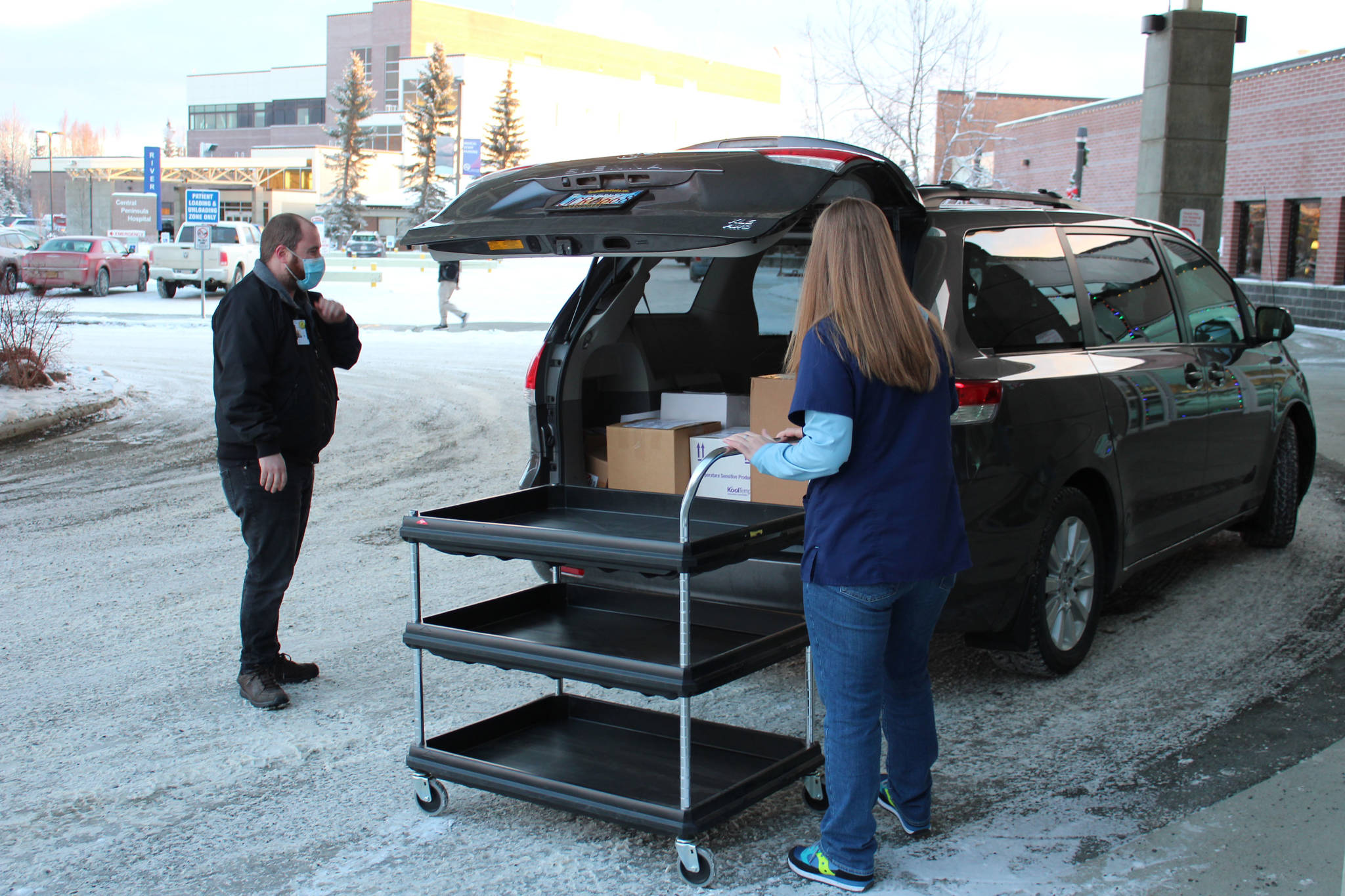The latest weapon in the fight against the COVID-19 pandemic arrived Wednesday at the doorstep of Central Peninsula Hospital in the trunk of a Toyota Sienna minivan driven by Ronald Lyon.
Lyon, who is a courier with Anchorage Messenger Service, drove CPH’s 975 doses of Pfizer’s COVID-19 vaccine from Anchorage to Soldotna on Wednesday morning.
“Believe it or not it is the best car we have for this road,” said Lyon. “I mean, we have other all-wheel drive vehicles, but for some reason the way it’s designed, man it’s good!”
While Lyon and CPH Pharmacy Technician Jessica Hulet unloaded boxes from the van, health care workers in CPH’s upper windows looked on and waved.
Because CPH is considered a “mini depot,” they will be distributing some doses to places like pharmacies and EMS, said CPH External Affairs Director Bruce Richards on Monday. Richards said that CPH will keep 540 of the 975 doses they received to be administered to health care workers and others who have been given first priority. Richards said that vaccinations will begin on Friday for hospital employees depending on their schedules and availability.
Alaska’s December allotment of 35,100 doses of the Pfizer vaccine arrived in Alaska earlier this week via UPS plane.
The vaccine, made by Pfizer and BioNTech, received Emergency Use Authorization (EUA) from the U.S. Food and Drug Administration (FDA) last week. Receiving the EUA means the vaccine cannot be mandated by government entities or by private businesses. Another COVID-19 vaccine, made by Moderna, is currently being evaluated for EUA by the FDA. Because Moderna’s vaccine was submitted to the FDA for EUA consideration almost immediately after Pfizer’s, states are not expecting to wait long for those vaccines to arrive as well.
Storage of Pfizer’s vaccine has proved challenging from a logistical standpoint for the state, as it must be kept in ultra-cold temperatures ranging from -130 to -76 degrees Fahrenheit. In transit, the vaccine is stored in a box packed with dry ice. Pfizer designed shipping containers packed with dry ice that can maintain ultra-cool temperatures for up to 30 days as long as the dry ice is replenished upon receipt and every five days afterwards. According to DHSS, the shipping containers are also equipped with temperature and tracking devices to ensure the vaccine is kept in the correct conditions throughout shipment. While in an ultra-cold freezer, the Pfizer vaccine can be stored for up to six months.
After loading the boxes onto a cart, Richards said Hulet would be immediately transporting the doses into CPH’s freezer.
Both the Pfizer and Moderna vaccines have efficacy rates of over 90% and require two doses to be effective. Individuals receiving the Pfizer vaccine must receive the second dose 21 days after receiving the first. Those receiving the Moderna vaccine must receive the second dose 28 days after receiving the first.
According to a DHSS release on Wednesday, hospital-based front-line health care workers received some of Alaska’s first doses of the Pfizer vaccine on Tuesday. Vaccination clinics in some communities also began on Tuesday and continued into Wednesday.
According to the same release, a health care worker who has no history of allergies had an anaphylactic reaction to the vaccine that included flushing and shortness of breath. The worker began experiencing the reactions 10 minutes after receiving the vaccine at Bartlett Regional Hospital in Juneau. When the worker’s symptoms did not resolve after being given Benadryl, they were admitted to Bartlett’s emergency department where they were given Pepcid, Benadryl and epinephrine through an intravenous drip. The individual was kept overnight and is in stable condition, but is still in the hospital being monitored.
“We expected that a side effect like this could occur after reports of anaphylaxis were made in England after people there received the Pfizer-BioNTech COVID-19 vaccine,” said Alaska’s Chief Medical Officer Dr. Anne Zink in the release. “All sites that are approved to provide vaccinations in Alaska must have medications on hand to deal with an allergic reaction and that was the case in Juneau.”
In determining who receives the vaccine and when, the state is following guidance from the CDC Advisory Committee on Immunization Practice (ACIP).
The people in Alaska given first priority for the vaccine include hospital-based front-line workers at highest risk for COVID-19 infection, long-term care facility residents and staff, EMS and fire personnel providing medical services, Community Health Aides/Practitioners and individuals required to perform vaccinations.
DHSS has defined long-term care facilities to include skilled nursing facilities, assisted living homes and Department of Corrections infirmaries providing care similar to assisted living.
The vaccine will be offered to Alaskans in phases over time until everyone has access.
More information about COVID-19 in Alaska and DHSS’ distribution plan can be found on DHSS’ website at http://covidvax.alaska.gov/.
Reach reporter Ashlyn O’Hara at ashlyn.ohara@peninsulaclarion.com.

